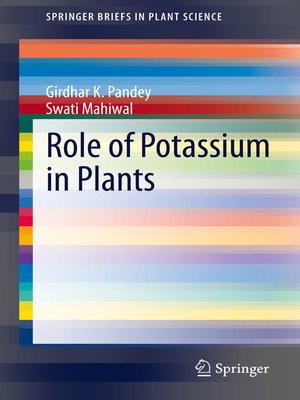
Sign up to save your library
With an OverDrive account, you can save your favorite libraries for at-a-glance information about availability. Find out more about OverDrive accounts.
Find this title in Libby, the library reading app by OverDrive.



Search for a digital library with this title
Title found at these libraries:
| Loading... |
Potassium (K+) is an essential mineral macronutrient abundantly present in the cytosol which, unlike other macronutrients, is not metabolized and does not integrate into macromolecules. Compared to animal cells, K+ is more abundantly present in plant cells.
Overall performance of the plant, and operation of metabolic machinery depends upon intracellular K+ homeostasis (K+ uptake and efflux) via K+ channels and transporters acting as mediators of cellular responses during plant development. Unlike animals, plants lack sodium/K+ exchangers; plant cells have developed unique transport systems for K+ accumulation and release. In Arabidopsis thaliana, 71 K+ channels and transporters have been identified and categorized into six families.
Plant adaptive responses to several abiotic and biotic stresses are mediated by regulation of intracellular K+ homeostasis. In this report, we highlight the role of K+ in abiotic and biotic stresses, features of channels and transporters responsible for its homeostasis along with its evolutionary relationship, perception and sensing mechanisms, and K+ deficiency triggering different signaling cascades.
Overall, this book covers the role of K+ in plants would be significantly helpful to research, academic community as well as students to understand the one of the major attributes of plant biology.






